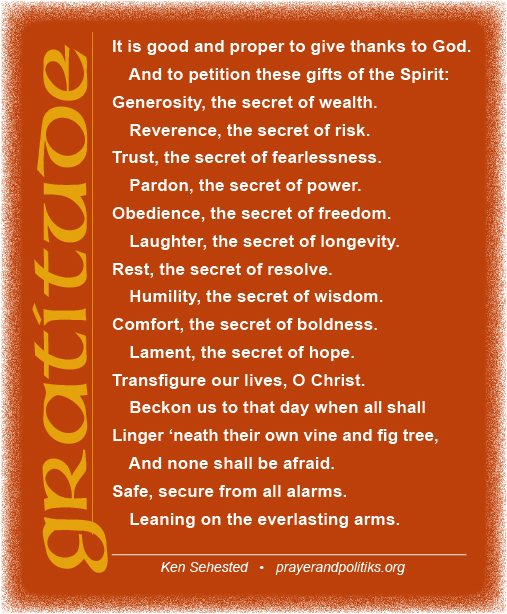by Ken Sehested
The topic of gratitude has become a marketing trend in publishing over the past decade—confirmed, most recently, in Diana Butler Bass’ best-selling Grateful: The Transformative Power of Giving Thanks, not to mention a score of  books written by and for the “positive psychology” school of authors and readers.
books written by and for the “positive psychology” school of authors and readers.
If you do a Google Scholar web search for the word, you immediately get 1.32 million results.
Scientists continue to provide confirmation of things mystics have promoted for eons: that singing is good for personal and communal health; that a cultivated devotional life tends to extend life expectancy; that wealth is not neutral but actually diminishes the capacity for empathy; that even the spiritual hunch that everything-is-connected is being confirmed by ecologists, cosmologists, and quantum physicists.
Such concurrence reminds me of the time, many moons ago, when I fled, midway through college, from my parochial Southern rearing to the urbane sophistication of New York City—only to discover that pointy-toed cowboy boots were the fashion rage in my newly-adopted Greenwich Village neighborhood.
I have to resist the temptation to cynically roll my eyes when old stuff becomes swank among the trendy, upscale crowd. The stubborn truth is that every abiding element of wisdom has to be renewed and reenergized from time to time: must be claimed and fortified and announced anew in every succeeding generation.
So, yes, read books, listen to podcasts, have conversations, and perform new-old rituals that buoy the cultivation of gratitude, the practice of thanksgiving—with or without traditional holiday fare of turkey and dressing. And do so not as a bartered arrangement for future profit, but simply as the response of the loved to the Beloved.
The Black Friday gods and their fashionista agents are relentless in their assurance that you need more—more goods, more gravy, more esteem and recognition. Surround yourself with a community that says otherwise.
# # #
©ken sehested @ prayerandpolitiks.org
Additional resources
• “Gratitude: A litany for worship”
• “Why is it hard to say thanks: 10 reasons”
• “On saying thanks,” a poem
• “Come Ye Thankful (and Ye Cranky) People Come,” a call to worship on Thanksgiving, by Abigail Hastings

